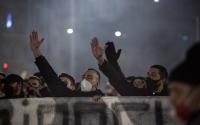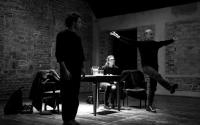13 September 2005Znet
The joy of liberation was felt first and foremost yesterday, and with more intensity than anyone else, by the thousands of Gazans whose lives had been totally disrupted and who had been just plain imprisoned in their homes and neighborhoods by the settlements and their military guardians for the past five years.
Mohammed Bashir's home lies just a few meters from Kfar Darom. In the past, he was a target for expulsion, or "solicited evacuation," by the settlers - even before the intifada. And then, during the intifada, the Israel Defense Forces turned his home into a military outpost, for all intents and purposes. At first, the IDF stayed in the house and confined his family to a single room; then, the soldiers took over the upper floors and the roof, turning them into a fortified military position. Draconian restrictions were imposed on the family - no guests, no going beyond the boundaries of the yard, no going out at night, no access to the roof.
From this very position some 18 months ago, an IDF officer shot Yussuf Bashir, then 15, who was escorting a number of UN representatives who had been allowed to visit the family back to their car. Yussuf Bashir was seriously wounded, and required lengthy treatment and rehabilitation.
On August 15, soldiers took over the house and forced the family to remain in a single room, almost without interruption, until yesterday morning. For 12-year-old Mohammed, who has spent more than one-third of his life as a prisoner of Kfar Darom, liberation day meant being able to wander freely through all the rooms of the family home, to go to the bathroom without having to request permission from soldiers, to go out into the yard without fear of being shot.
"From August 15, the whole family [parents and five children] was imprisoned in one room, day and night," he said yesterday. "It was the same room in which we had to spend the night for almost five years. The soldiers left the house on August 30, for one day. But they returned on August 31. We missed the first week of school. In order to eat, we would negotiate with the soldiers as if it was over Jerusalem.
"Two days ago," he continued, "they left at 6 in the morning, and so we could go to school. But when we returned, we found the house surrounded by tanks. And then we were imprisoned in the house again, and we didn't sleep that night. We didn't leave [the house] until the three tanks left, at around noon."
Omar Sa'ar left his home in Khan Yunis in the early hours of yesterday morning and headed in the direction of his family's land in the Muasi area, about 1.5 kilometers away. He was off to see his four brothers, who he hadn't laid eyes on for three years. "And my brother approached from the other direction, until we met in the middle, and we embraced," he said yesterday.
Sa'ar worked in the Gush Katif settlements. The IDF did not allow workers to leave the area other than by the gate through which they had entered. The Muasi and the adjacent coastline was off limits to Palestinians, aside from some 5,000 whose identity cards listed their address as the Muasi. Strict rules governed their entrances and exits from Khan Yunis.
"It was such a sense of freedom yesterday to walk directly to the family guava grove that we couldn't market because the crossing was closed, " Sa'ar said yesterday.
"Oh, what a sense of freedom it was to embrace with my brother on our land," he said.






